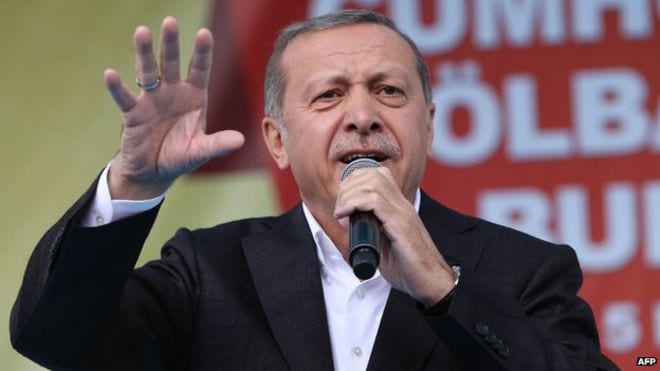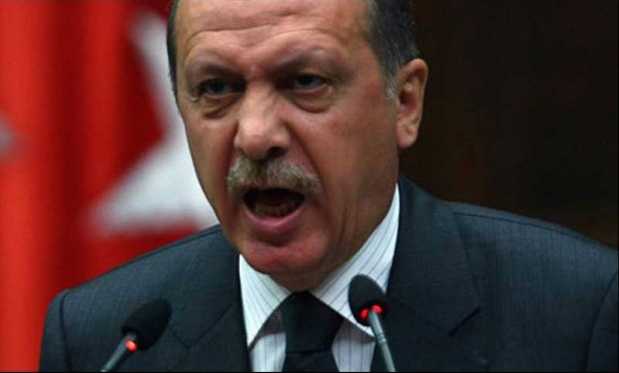oninstitute. org/templateC06. php?CID=1225
Turkey’s Turn from the West
Soner Cagaptay
Washington Post, February 2, 2009
Turkey is a special Muslim country. Of the more than 50 majority-
Muslim nations, it is the only one that is a NATO ally, is in
accession talks with the European Union, is a liberal democracy and
has normal relations with Israel. Under its current government by the
Justice and Development Party (AKP), however, Turkey is losing these
special qualities. Liberal political trends are disappearing, E.U.
accession talks have stalled, ties with anti-Western states such as
Iran are improving and relations with Israel are deteriorating. On
Thursday, for example, Prime Minister Recep Tayyip Erdogan walked out
of a panel at Davos, Switzerland, after chiding Israeli President
Shimon Peres for “killing people.” If Turkey fails in these areas or
wavers in its commitment to transatlantic structures such as NATO, it
cannot expect to be President Obama’s favorite Muslim country.
Consider the domestic situation in Turkey and its effect on relations
with the European Union. Although Turkey started accession talks,
that train has come to a halt. French objections to Turkish
membership slowed the process, but the impact of the AKP’s slide from
liberal values cannot be ignored. After six years of AKP rule, the
people of Turkey are less free and less equal, as various news and
other reports on media freedom and gender equality show. In April
2007, for instance, the AKP passed an Internet law that has led to a
ban on YouTube, making Turkey the only European country to shut down
access to the popular site. On the U.N. Development Program’s gender-
empowerment index, Turkey has slipped to 90th from 63rd in 2002, the
year the AKP came to power, putting it behind even Saudi Arabia. It
is difficult to take seriously the AKP’s claim to be a liberal party
when Saudi women are considered more politically, economically and
socially empowered than Turkish women.
Then there is foreign policy. Take Turkey’s status as a NATO ally of
the United States: Ankara’s rapprochement with Tehran has gone so far
since 2002 that it is doubtful whether Turkey would side with the
United States in dealing with the issue of a nuclear Iran. In
December, Erdogan told a Washington crowd that “countries that oppose
Iran’s nuclear weapons should themselves not have nuclear weapons.”
The AKP’s commitment to U.S. positions is even weaker on other
issues, including Hamas. During the recent Israeli operations in
Gaza, Erdogan questioned the validity of Israel’s U.N. seat while
saying that he wants to represent Hamas on international platforms.
Three days before moderate Arab allies of Washington, including
Egypt, Jordan and Saudi Arabia, gathered on Jan. 19 in Kuwait to
discuss an end to the Gaza conflict, Erdogan’s officials met with
Iran, Syria and Sudan in Qatar, effectively upstaging the moderates.
Amazingly, Turkey is now taking a harder line on the Arab-Israeli
conflict than even Saudi Arabia.
For years, Turkey has had normal relations with Israel, including
strong military, tourist, and cultural and commercial ties. The Turks
did not emphasize religion or ideology in their relationship with the
Jewish state, so Israelis felt comfortable visiting, doing business
and vacationing in Turkey. But Erdogan’s recent anti-Israeli
statements — he even suggested that God would punish Israel — have
made normal relations a thing of the past. On Jan. 4, 200,000 Turks
turned out in freezing rain in Istanbul to wish death to Israel; on
Jan. 7, an Israeli girls’ volleyball team was attacked by a Turkish
audience chanting, “Muslim policemen, bring us the Jews, so we can
slaughter them.”
Emerging anti-Semitism also challenges Turkey’s special status. Anti-
Semitism is not hard-wired into Turkish society — rather its seeds
are being spread by the political leadership. Erdogan has pumped up
such sentiments by suggesting Jewish culpability for the conflict in
Gaza and alleging that Jewish-controlled media outlets were
misrepresenting the facts. Moreover, on Jan. 6, while demanding
remorse for Israel’s Gaza operations, Erdogan said to Turkish
Jews, “Did we not accept you in the Ottoman Empire?” Turkey’s tiny,
well-integrated Jewish community is being threatened: Jewish
businesses are being boycotted, and instances of violence have been
reported. These are shameful developments in a land that has provided
a home for Jews since 1492, when the Ottomans opened their arms to
Jewish people fleeing the Spanish Inquisition. The Ottoman sultans
must be spinning in their graves.
The erosion of Turkey’s liberalism under the AKP is alienating Turkey
from the West. If Turkish foreign policy is based on solidarity with
Islamist regimes or causes, Ankara cannot hope to be considered a
serious NATO ally. Likewise, if the AKP discriminates against women,
forgoes normal relations with Israel, curbs media freedoms or loses
interest in joining Europe, it will hardly endear itself to the
United States. And if Erdogan’s AKP keeps serving a menu of
illiberalism at home and religion in foreign policy, Turkey will no
longer be special — and that would be unfortunate.
Soner Cagaptay is a senior fellow and director of the Turkish
Research Program at The Washington Institute, and author of Islam
Secularism and Nationalism in Modern Turkey: Who Is a Turk?







Thank you for this. Excellent as usual.
Ithink it is those shoes they are wearing….. First Muntadar threw his Turkish made shoes at Bush, and now the Turkish Prime Minister is head-butting with Perez. Yes Im sure he has his bought a new pair of Muntas :)))
29 Jan 09 at 11:08 pm
[…] Read more here on PULSE.ORG […]
It must be in those Turkish shoes they are wearing… « Ignited Identity
29 Jan 09 at 11:11 pm
Woohoo! Feels good!
29 Jan 09 at 11:28 pm
Following the massacre on Google Trends Turkey was one of the countries which seemed most interested in Gaza. I’m sure he will have a lot of popular support for this at home.
Well done Mr Erdogan!
30 Jan 09 at 12:31 am
Shame on all the shameless arab leaders. They are cowards and puppets. Very soon they will all go to hell for their silence. Yaaaaaaaaaaaaaaaayyyyy Erdogan
30 Jan 09 at 12:52 am
[…] Veo más en Pulse, en inglés. “A star is born“. Possibly related posts: (automatically generated)Israel destruye y deja sitio al […]
Erdogan, Gaza, la dignidad de Turquía y Davos « Situjihadismo
30 Jan 09 at 1:07 am
Thank you, PM Erdogan, for standing up for what is right, for showing some spine and conscience when much of the rest of the world’s sham representatives stayed silent. Shame Shame Shame to most of the Arab “leaders”. Kudos to Türkiye.
30 Jan 09 at 1:12 am
That was beautiful! Brought tears to my eyes and a lump in my throat. What a man. Erdoğan was heroic, and he made the others look like dickless little prigs at tea. Viva Türkiye! To think the EU gave them so much shit about membership. They should have been pleading.
30 Jan 09 at 1:37 am
Al Jazeera was just showing Erdogan receive a hero’s welcome on his return. Crowds were gathered at the airport with Turkish and Palestinian flags to greet him. I bet the Kemalists are squirming.
30 Jan 09 at 1:49 am
Turkey has some room to maneuver vis-a-vis Israel and the US, which is not speaking much of those Arab states. Erdogan will be showered with praise.
How deeply ironic is it that those who are the most vocal on the Palestinian cause ARE not Arab but Turk, Lebanese Shiite and Persian?
30 Jan 09 at 4:59 am
A shame file of Arab journalists giving Israel a free pass from Iqbal Tamimi:
30 Jan 09 at 8:02 am
Shame on American leaders. Even when america presidents were kicked on th face( by Sharon as reported by BBC during gaz conflict of 2002, albeit metaphorically) Americans could not react out of fear of Zionist lobby.Erdogan is man with back bone. a man of honour and courrage.
30 Jan 09 at 1:22 pm
Muhammad,
I just read over at Philip Weiss’s blog a rather more detailed description of what went over at Davos. I haven’t watched the entire episode unfold but I wonder what is your take on it?
Nevertheless, Peres is one official on crack.
31 Jan 09 at 4:56 am
[…] consistently and impartially applying rules to speakers. That debate in which Turkish PM Erdoğan walked out involved deliberately unequal times for speakers (see my calculations of actual speaking times in […]
Peres’s Propaganda and Gaza Panel’s Biased Moderator « Silver Lining
31 Jan 09 at 3:13 pm